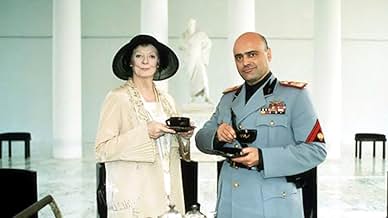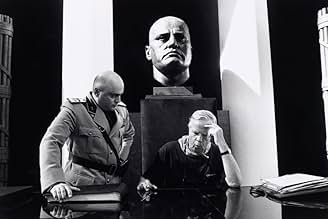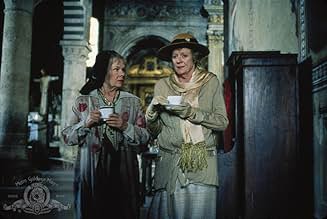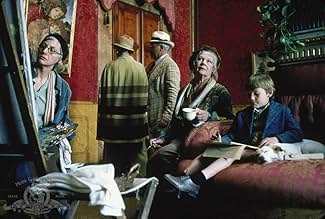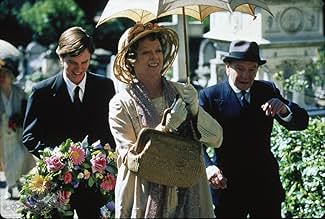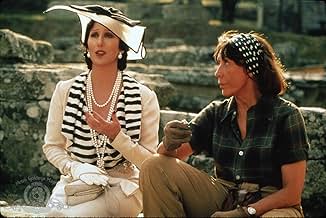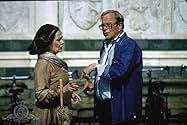Nella Firenze degli anni trenta, il piccolo Luca rimasto orfano della madre e abbandonato dal padre che non lo riconosce, viene accudito e cresciuto da un gruppo di dame inglesi piene di amm... Leggi tuttoNella Firenze degli anni trenta, il piccolo Luca rimasto orfano della madre e abbandonato dal padre che non lo riconosce, viene accudito e cresciuto da un gruppo di dame inglesi piene di ammirazione per Mussolini.Nella Firenze degli anni trenta, il piccolo Luca rimasto orfano della madre e abbandonato dal padre che non lo riconosce, viene accudito e cresciuto da un gruppo di dame inglesi piene di ammirazione per Mussolini.
- Regia
- Sceneggiatura
- Star
- Ha vinto 1 BAFTA Award
- 5 vittorie e 3 candidature totali
Recensioni in evidenza
Zeffirelli's autobiographical movie TEA WITH MUSSOLINI is a charming sentimental piece of work the action of which takes place in the Italy of the 1930s and 1940s: the hardest period not only in the lives of those many who were living then but for the entire 20th century history, when, as many readers will probably agree with me, humanity seemed to be conquered by infernal ideologies and bestial hatred. Yet, according to what Zeffirelli shows us in the movie, even in those darkest days, there was also room for beauty protection, care, art admiration and mutual help. As a Zeffirelli's fan, I consider TEA WITH MUSSOLINI one of the director's best films. But not because it only shows how bad war was. That is something most of us already know well. I love the film for other reasons. I like it because...
...there are moments when you will cry, when you will think and when you will genuinely laugh. A proper balance of emotions supplied by the director makes the movie a very decent entertainment filled with affection, sorrow, even nostalgia but also fun, charm and comfort. Who can possibly skip the scene of football match, for instance? I also laughed openly at the moment the ladies teach the soldiers saying "Good night". Isn't that a useful way to teach good manners and a foreign language at the same time? The moving moment in the orphanage will leave your eyes teary and the words of Ms Wallace about our contact with dead people may put you to nostalgia. But not for long. This fact of the film's "heart" goes in pairs with brilliant musical score Zeffirelli is famous for in his movies galore. What depth is there in this music and what supply of positive emotions!
...there are, except for variety of moments, beautiful Tuscan landscapes which make the movie a true postcard from Florence, San Gimignano and a true promotion of the Florentine art. This is also in accordance with the "soul" that Zeffirelli is so deeply attached to. The colorful hills around San Gimignano and the unique flowers under the Tuscany's sun leave hardly anyone indifferent. Consider, for instance, Luca's introduction of San Gimignano while he follows the bus with the ladies.
...there are foremost genuinely flawless performances that have to be linked to the deep development of characters. That is the aspect I'd like to pay more attention to in my comment. The ladies who occur to be at the focus are unforgettable. They supply the partly Italian movie with the truly English spirit. Maggie Smith does a wonderful job as Lady Hester: elegant, well mannered but also naive in her confidence in Mussolini and reluctant of Americans, the lady who drinks the spectacular but tragic tea with the duce. Judi Dench is memorable as Arabella who has drunk the wine of Florence, warmed her hands with the fire of Boticelli and Michelangelo and wants to share this inner experience with other people. Joan Plowright is, as usual, genuine and unforgettable. She fits to particular roles and although she has carried some other brilliant roles in latest Zeffirelli movies, Ms Mary Wallace seems to be the character for her. Joan portrays a warm hearted lady who is not only a good cook introducing Luca to bacon with eggs but also a great intellectual so much in love with Shakespeare. Cher representing the American side is also very appealing as Elsa - a luxurious woman with a flair for paintings, a Picasso connoisseur whose cup of tea is not only modern art but also good heart. She once helped Luca and the time will come for her to be helped in the spirit of Shakespeare "Love thyself less"... Through these different characters, Zeffirelli appears to present the wonder of diversity in human beings. The two seemingly contradictory characters, Elsa and Lady Hester, seem to be of totally opposite natures. Yet, even they turn out to have something in common... Finally a mention must be made of Baird Wallace who perfectly portrays Luca as a youngster and Charlie Lucas as Luca a little boy. Great young talents!
There is, finally, a great message of the film: that war cannot ruin the world, that the power of spirit is endless, that real art is born in the deep of one's heart. The final scene when Arabella says at the remained fresco of Santa Fina Funeral "Let Her sleep" seems to symbolize an eternal human quest for the sublime and the mysterious presence. If the "presence" is there, we shouldn't have anything to worry about. The horror of war is ceased and the historic sounds of San Gimignano bells ringing out joyfully together with the director's message proclaim the reconciliation and peace. The twin towers stand as silent witnesses...
Franco Zeffirelli, we should indeed appreciate art since it is the art that may bring out the genius of mankind.
The setting is the Florentine treasure troves of Tuscan art, the Uffizi, Il Duomo and the Academy. The English are led by three grand dames of the theatre, Joan Plowright as Arabella, Luca's chief protector, Maggie Smith, and Judy Dench (with her real life husband Michael Williams in a supporting role as the British consul.). Then there are two equally larger than life Americans, a retired but still glamorous movie star played by Cher, and a bike-riding lesbian archaeologist played by Lily Tomlin. Most of the Italian characters are overshadowed by all this Anglo ego. (Or maybe it's just poor dubbing, or John Mortimer's part in the scriptwriting). The two boys playing Luca at different ages are good looking but the older one in particular is a bit vacuous, and Cher's impossibly handsome Italian boyfriend puts in a wooden performance.
There are a couple of plot-lines (will Cher escape the Jewish round-up, will the ladies make it through the war OK) and the occasional funny scene but the interest is really in the characters. Not that all of them are particularly attractive people. Maggie Smith's Lady Hester, widow of a former British Ambassador to Italy, is a dreadful old snob with hardly any brains who likes the fascists and has scarcely a good word for anybody else except her late husband. She engineers the tea party with Il Duce, fondly imagining that Mussolini himself will ensure the ladies' safety in Florence. A few days later the local fascists tip them out of the Uffizi gallery where they were accustomed to take tea while they sketched the old masters. Yet at the end she does show a little genuine good grace when she intervenes to help Cher.
It's a curious piece, reminiscent of "Life is Beautiful" - a light comedy with a deadly serious titanic struggle between good and evil going on in the background, a background which seems altogether too gorgeous to accommodate such evil. Good, represented by a Scottish major, triumphs in the end, only to be put in his place by the Scorpioni. Zeffirelli here pays his artistic and personal debt to them. Wacky though they were, the Scorpioni did know the difference between good and evil, or at least the difference between good art and bad art, and they taught Zeffirelli well.
I was surprised how good the movie was - I was in tears several times, especially with visuals that bring up the same comparisons as "The Train" did, with art vs. war, humanity's heights of creativity vs. its lows of prejudice and violence.
These Oscar-winning ladies are absolutely terrific, yes including Cher. One elderly gentleman behind me complained that Maggie Smith basically always plays the same character but I thought her character does change towards the end. The others were certainly not their usual on-screen personas, Judi Dench as a free-spirited artist, Joan Plowright as a quite warm-hearted grandmotherly type, and Lily Tomlin a hoot as a butch archaeologist.
But why choose bland Italian actors for them to play off of? To make the Scorpioni, as they are called, stand out more? The Italians seemed stereotyped to me, Latin lover, ignorant peasants not appreciating their ancient artistic heritage.
What the movie also brought to mind is how few Italian movies have dealt with their fascist past as much as the French have been exploring their consciences of collaboration in film. Sure "Garden of Finzi Continis," "Two Women" and "Life Is Beautiful" show arrests, etc. but I don't get the sense of soul searching as to how did this happen here and could it again? Just because they didn't have Shakespeare and appreciate the treasures of the Uffizi as this film implies? (originally written 5/15/1999)
The settings are skilfully designed to draw the viewer in, and when you are setting your movie in Florence and its environs you can't go wrong anyway. The ongoing clash between two worlds i.e. Lady Hester Random (Maggie Smith) versus Elsa (Cher) reaches a satisfying resolution which it would be unfair to reveal.
There are splendid comic vignettes mixed into the overall drama. Judi Dench and her dog being thrown out of the cathedral, sharply contrasts with the chilling moment when the Jewish arts professor is taken away by the Gestapo. Understated but none the less effective, probably more so, because of it.
If you haven't seen this film, see it as soon as you can.
Lo sapevi?
- QuizCher has stated that the only reason she took the part of Elsa was because Writer and Director Franco Zeffirelli said he could only see her and no other actress in the role.
- BlooperThe tanks the Germans ride in are, in fact, U.S. Army M4 Shermans, not German-built Panzers.
- Citazioni
Lady Hester: The Germans and the Italians couldn't get rid of us. There is absolutely no reason why we should surrender to the Scots.
- Versioni alternativeThe MGM DVD, ISBN 0-7928-4300-2, is missing least one shot: The original tea with Mussolini scene ends with Mussolini forcing himself upon the reporter, forcing her onto his desk (i.e., he rapes her.) This DVD omits that ending and leaves the reporter's change in behavior unexplained.
- Colonne sonoreMattinata Fiorentina
Written by Giovanni D'Anzi (as D'Anzi) and Michele Galdieri (as Galdieri)
Performed by Alberto Rabagliati
I più visti
- How long is Tea with Mussolini?Powered by Alexa
Dettagli
Botteghino
- Budget
- 12.000.000 USD (previsto)
- Lordo Stati Uniti e Canada
- 14.401.563 USD
- Fine settimana di apertura Stati Uniti e Canada
- 1.633.183 USD
- 16 mag 1999
- Lordo in tutto il mondo
- 14.401.563 USD
- Tempo di esecuzione1 ora 57 minuti
- Colore
- Mix di suoni
- Proporzioni
- 1.85 : 1
Contribuisci a questa pagina



